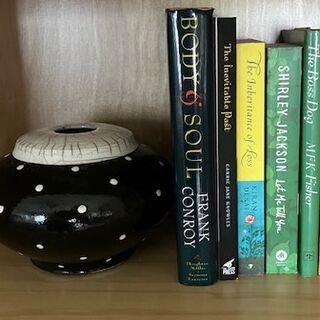Friends
Bibliotherapy: The Healing Power of Reading
Is reading a novel a better way to survive COVID than watching Netflix?
Posted August 5, 2022 Reviewed by Lybi Ma
Key points
- Television is entertaining, but books challenge us to think about our lives.
- Novels may be the greatest self-help books of our time.
- Books can help us understand the stories in our own lives.

They’re everywhere. Sweet, hand-painted wooden boxes on neighborhood streets with wide glass doorways so you can see what’s inside: books, free for the taking. Castoffs. Mostly romances. An occasional thriller. Out-of-date travel and computer books. Lots of children’s books with at least one torn or colored page. The occasional cookbook that failed to inspire.
If I’m not in a hurry, I’ll stop and look through the glass door. If some title is tempting, I’ll open the door, browse for a minute, then keep walking, usually empty-handed.
During COVID I have been obsessed with the news but have largely quit reading books. I’m not the only one. Many of my friends have complained they just don’t have the focus, the bandwidth, or the desire to read a novel from cover to cover.
Instead, we binge-watch just about anything on streaming to escape and fill the evening hours because there is yet another strain of COVID out there waiting to infect us in a restaurant, at a party, while having dinner with friends, grocery shopping, or doing just about anything anywhere inside.
Ironically, the whiplash of the last few years of COVID has created the truly golden years of streaming television. But it comes with a price.
David Frost once said: “Television enables you to be entertained in your home by people you wouldn’t have in your home.”
True.
Marvin Minsky, the cognitive and computer scientist who was an AI pioneer, also said: “Imagine what it would be like if TV actually were good. It would be the end of everything we know.”
Sadly, television has replaced the escape we once sought from books.
Paula J. Schwanenflugel, Ph.D., and Nancy Flanagan Knapp, Ph.D., in their post, Bibliotherapy: Using Books to Help and Heal, make a great case for reading books, particularly novels, to get help, heal, and find a path forward in our lives.
As explained in their post, the idea of bibliotherapy has existed since ancient times. The library at Thebes in ancient Greece had written over its door, “Healing Place of the Soul.”
Stories not only entertain and inform but also have the power to challenge, comfort, and guide. Television can be powerful and even give us a feeling of comfort when everything turns out okay in the end but watching is passive. Television entertains. That’s not a bad thing; in fact, it can be a good thing, but it’s not as good as reading a book.
Reading is active. It engages us in a deeper way than just watching. Reading is powerful. It challenges us to view the world and ourselves differently.
A really good book provides two things streaming rarely can: a door and a mirror. The door is that moment in the story where the reader becomes involved and engages with the narrative. Readers often refer to this moment as being hooked, as in “From the first page, I was hooked and couldn’t stop reading.”
Once hooked by the story, the reader begins to engage in the story on a deeper level: they approach the mirror of the narrative and begin to see the reflection of their own lives in the story. The reader steps out of their own life for a moment and wonders what they would do in the same situation the main character is facing.
Streaming television speeds by. It’s full of action. You read a book at your own pace. Reading invites you to let go, relax, and reflect on the moment.
Reading is also a private affair. It’s your time away, alone. It’s a kind of balm for the hurried soul. The antidote for hard times.
A good bibliotherapist, or even a good librarian or bookstore clerk, can help you find just the right book you might need to read to help you through a tough time.
For instance, let’s say you are stuck in the middle of a pandemic and you have lost hope that there's any end in sight. A bibliotherapist might suggest you should read Michael Crichton’s The Andromeda Strain, or something a little less heart-racing and a bit more uplifting like Gabriel Garcia Marquez’s Love in the Time of Cholera, or even the truly charming escape-worthy novel Hamnet by Maggie O’Farrell that’s riddled by the plague and entangled in love and the need to create to survive.
One of the great gifts of any good story is that while we read, we can discover how the main character develops and changes.
That, in a nutshell, is the hook of any good book and the mirror we want to gaze into. We take pleasure in seeing a character develop and change, and as we do we want to believe that in a similar situation we too can survive, change, grow, and embrace our better angels.
It’s those better angels that are going to get us through all this and more. This is why I’ve decided to take my own advice and turn off the streaming tonight and settled into a good book and a better frame of mind.
We’ve got a long way to go before we are done with this plague and can get on with a safer, kinder life full of friends and family, hopes, and new dreams.




